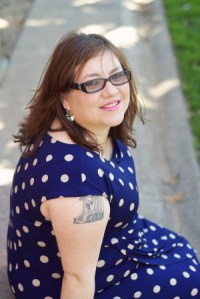Today I welcome Isabel Quintero, author of Gabi, A Girl in Pieces. I absolutely loved getting to know Gabi and seeing the world through her eyes! Thanks to Isabel Quintero for today’s guest post.
About the Book:
 Gabi Hernandez chronicles her last year in high school in her diary: college applications, Cindy’s pregnancy, Sebastian’s coming out, the cute boys, her father’s meth habit, and the food she craves. And best of all, the poetry that helps forge her identity.
Gabi Hernandez chronicles her last year in high school in her diary: college applications, Cindy’s pregnancy, Sebastian’s coming out, the cute boys, her father’s meth habit, and the food she craves. And best of all, the poetry that helps forge her identity.
July 24
My mother named me Gabriella, after my grandmother who, coincidentally, didn’t want to meet me when I was born because my mother was unmarried, and therefore living in sin. My mom has told me the story many, many, MANY, times of how, when she confessed to my grandmother that she was pregnant with me, her mother beat her. BEAT HER! She was twenty-five. That story is the basis of my sexual education and has reiterated why it’s important to wait until you’re married to give it up. So now, every time I go out with a guy, my mom says, “Ojos abiertos, piernas cerradas.” Eyes open, legs closed. That’s as far as the birds and the bees talk has gone. And I don’t mind it. I don’t necessarily agree with that whole wait until you’re married crap, though. I mean, this is America and the 21st century; not Mexico one hundred years ago. But, of course, I can’t tell my mom that because she will think I’m bad. Or worse: trying to be White.
Guest Post:
For Reals
by Isabel Quintero
One of my biggest pet peeves (I have a lot) is hearing adults say things like, “When I was in high school, girls didn’t get pregnant,” “When I was in high school, we didn’t behave like that,” or “When I was in high school, there weren’t that many gay teens; now they’re everywhere.” They’re lies! All of them! Of course there were pregnant girls! They were just sent away or forced to get married. I remember being in 8th grade and one of my classmates being forbidden to participate in our promotion ceremony because she was visibly pregnant. Teens have always had sex. Always. In the same way that there have always been gay teens. Yes, there are more visibly gay teens in schools, because, well, progress. Fifty years ago, if a high school student had tried to openly date a person of the same sex, the PTA would have had a coronary and the student probably would have been seen as a sexual deviant, and a threat to others. Let’s not kid ourselves, we have a long way to go on that front, but it looks like things are changing; slowly, but changing. As much as adults try to pretend that these are strictly adult issues, they’re not.
I was reflecting on the conversation between my mom and I about sex, and realized we never had one. I was never told how babies were made; I think learned from reading Judy Blume. I was simply told that sex was bad, and like Gabi’s mom tells her, “Ojos abiertos, piernas cerradas.” Like many of my friends, I had so many questions and was so curious about sex, but had no one to turn to, so I avoided it. Avoided boys, felt that I was “bad” for having those thoughts and feelings, and had incredibly low self-esteem. I didn’t want that for Gabi. I wanted her to realize that sex was normal, and that what she was feeling was normal, even for girls. I think this part of the book is problematic for some people to wrap their head around; this idea that women, young women, women in their teens, have sexual thoughts. Automatically it’s, and I have gotten this reaction, “Why is Isabel promoting promiscuity?” I’m not. And I’m not judging it, either. If anything, I am presenting an honest portrayal of what it means to be a teen girl who is fighting against the stigma that comes with wanting to have sex or being curious about sex. Feelings that are not new to this generation and that have been felt by teens before them, since the beginning of time.
When I began writing Gabi, A Girl in Pieces, I wanted to make the story as realistic as possible, not only in terms of sex, but in regards to other issues as well, and the only reality I had to work with was mine. I grew up around addiction and alcoholism, like many other kids, however it’s not something we talked about. Working in education, I began to see that there were so many kids who had family members who were addicts but had no one to talk to. The books they read, were often about happy White kids, with traditional middle class families; none of which reflected their reality.
As writers and educators we always tout the power of writing and reading. We are always saying how reading changes lives because it opens up our minds to new worlds and new possibilities. That’s true. But what happens if you don’t see yourself reflected in those pages, at all? What happens if you’ve never encountered a protagonist with a name like yours, a name like Lupita, Juan, Mannar, Amir, or Pedro? What happens if you only seeing heterosexual couples going on a first date or going to prom? Or what happens if you never see people who are blind or in wheelchairs as active participants, not just background characters, in a story? Words construct our identity and reality, and they construct our perception of how the world should work. Being able to connect to a story, to a protagonist, to a setting, has so much power in feeling validated and a part of the world in which you reside. I don’t only mean in works of fiction either, that goes for science, history, art, and even (gulp) math. But I am a writer, not a mathematician, so that’s all I know-stories have the power to create worlds on the page and to create change in the real world.
I tried to do that with Gabi. Gabi, is as real as they come. I can say that because she is a whole lot like me, and a whole lot like teens I knew and know. She is dealing with incredibly heavy issues, like abortion, rape, pregnancy, addiction, and unrealistic gender expectations. Yes, she is a fat girl (homegirl likes food-a lot), but that’s not all she is. That doesn’t even begin to define her. In fact, she is constantly fighting against letting that define who she is because she knows that there are much bigger fish to fry, like getting into college, and hoping her dad doesn’t overdose. Some people may argue that that’s too much to happen in one school year, to one person, and that it’s not believable, but it is; it just depends on whose reality you’re writing.
About the Author:
Isabel Quintero is a writer, poet, teacher, wife, friend, sister, daughter, granddaughter, aunt niece, and a bunch of other things. She lives in the Inland Empire, where she was born and raised by Mexican immigrant parents and Mexican immigrant granddparents; the hospital where she was born in was converted to a Lowe’s hardware store. That’s how long ago she was born.
She learned to love reading and the written word from a very young age when her mother used to read to her Amelia Bedelia. That love was fostered by teachers and professors throughout her schooling and she is sure if they hadn’t boosted her ego for all those years she would have never dared letting the world see what she had written.
Gabi, A Girl in Pieces is her first young adult novel.
Website
Twitter
Goodreads
Facebook
Check out all stops on the Cinco Puntos Press Morris Finalist blog here!












Leave a Reply